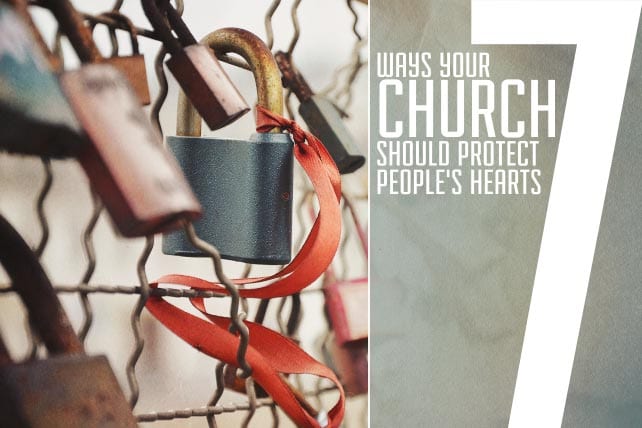We have thought about guarding hearts at a conference/ministers gathering, and at Bible school. But what about the local church?
The church is a mixed group of people, and there will always be some who are feeling very fragile or weak. They may not show it. Nevertheless, we need to be people who guard hearts in the church environment. Good music and good preaching is not enough. Many a great church service was undermined by thoughtless comments in times of fellowship. So, here are seven ways to guard hearts at church. You can certainly add more, and I might too!
1. Pray biblically for the church people. Take a look at the prayers in Paul’s epistles, they are not full of “be with” and “just really bless” prayers. Pray for people in your church to have the eyes of their hearts enlightened to know God more profoundly, to grow in their relationship with Christ, to grasp the richness of union with Christ, to be gripped by the hope to which God has called them, etc. Bring people to God’s throne and you will find yourself caring for them more carefully at church.
2. Look for ways to serve, don’t just be a consumer. The church is not a social club paid for by others and provided for your consumption. The church is a gathering of Christ’s people who worship together, learn together, serve together and grow together. Consumers drain, but you can serve. There are probably several ministries in your church that feel stretched for people, ask and you will find opportunities to serve.
3. Build others up in every conversation. In one visit to church, or to home group, you might interact with 10 or 20 people. Can you imagine the impact if you built up every one you spoke to? Encourage. Thank. Smile. Ask questions. Show interest. Share resources. Share Bible highlights. Celebrate people. Value. Well-handled conversations are priceless ministry in the life of a local church.
4. Be a dead end for gossip. “Does he know you are telling me about this?” That question tends to stop an evil report in its tracks. Someone has to. Gossip is like a cancer that can ravage a church. “Please don’t talk to anyone else about this, please go to him.” This is the best follow up with someone talking about a situation rather than doing the right thing. People should forgive and bear with, or forgive and lovingly confront. Don’t let gossip be an option.
5. Trust people. Many of us are great at assuming the worst and speculating about other people. Andy Stanley nailed this issue when he preached a message about filling the gap between expectations and experience with trust. When there is a gap between expectation and experience, fill the gap with trust. If you can’t do that, then go to the person and ask them to help you fill the gap with trust. Settling on distrust is not loving for them because either you are wrong (it does happen), or they need the opportunity to grow. Settling on distrust is not healthy for you or the church, either.
6. Be sensitive to the Holy Spirit. He is very alert to interpersonal relationships and wants them to be truly united. Be sensitive to any comment that causes someone to pull back. It could be humor, or criticism, or even a misunderstanding, but handle relationships and feelings with tenderness and care. Ask God to help you love others well—the Spirit is very motivated to coach you in that.
7. Be thankful for leaders, and others, and tell them. It doesn’t take any spiritual maturity, or personal skill, to be destructively critical. You can do massive damage to your church. Since God loves the church so much, being destructive seems inherently foolish. Support and encourage leaders at every level. Be a person who communicates gratitude to leaders, and to Sunday School teachers, and to children’s workers, and to people working the sound desk, and to the set-up team, etc.
This is only a start, what would you add?













